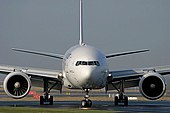Senior U.S. aviation official resigns after crisis in control towers termed 'unacceptable'
Friday, April 15, 2011

Image: Federal Aviation Administration.
Hank Krakowski, the head of air traffic organization at the Federal Aviation Administration, has resigned after Ray LaHood, the United States transport secretary, said he was "totally outraged" as it emerged five air traffic controllers have been suspended this year for falling asleep while on duty. In one incident, two passenger jets landed without any guidance from the control tower at Ronald Reagan National Airport in Washington D.C. after the lone controller fell asleep.
"I am totally outraged by these incidents," LaHood said. "This is absolutely unacceptable. The American public trusts us to run a safe system," he added, vowing to do anything necessary to resolve the issue. His comments came as the FAA announced new plans to tackle fatigue in controllers, saying they were taking immediate steps to employ additional staff at 27 airports across the U.S. The FAA said it would "not tolerate" controllers falling asleep on duty. "This type of unprofessional behavior does not meet our high safety standards," a spokesperson said.
| I am totally outraged by these incidents. This is absolutely unacceptable. The American public trusts us to run a safe system. | ||
—Ray LaHood, U.S. transport secretary | ||
Krakowski's resignation will likely be seen as an indication that the crisis in control towers across the U.S. is growing. Randy Babbitt, the administrator of the FAA, confirmed Krakowski had submitted his resignation, which had accepted. "Over the last few weeks we have seen examples of unprofessional conduct on the part of a few individuals that have rightly caused the traveling public to question our ability to ensure their safety," he said. "This conduct must stop immediately. I am committed to maintaining the highest level of public confidence and that begins with strong leadership." Babbitt said the FAA was conducting a "top to bottom review" air traffic control procedures.
A fifth controller was suspended this week after falling asleep while on duty at Reno-Tahoe International Airport in Nevada in the early hours of this morning, forcing an air ambulance carrying a patient to land without directions from the tower. The FAA said the flight crew made contact with a controller at a different facility and made a safe landing. "The controller, who was out of communication for approximately 16 minutes, has been suspended while the FAA investigates," a spokesperson said.

Image: Philippe Noret.
The incident is the latest in a string of controllers falling asleep on duty. Last month two passenger jets landed safely in Washington D.C. without clearance to do so because they were unable to make contact with any controllers in the tower at the airport. It emerged the only controller in the tower had fallen asleep after working four nights in a row. In February, a controller at McGhee Tyson Airport in Tennessee allegedly deliberately went to sleep while on duty. The controllers involved in both incidents have been suspended by the FAA. Additionally, the FAA is investigating two other incidents, one of which took place when a controller fell asleep at Boeing Field in April. It is understood the same controller was already being investigated after falling asleep twice in one night in January. Two controllers were also suspended late last month when they both appeared to fall asleep.
The National Air Traffic Controllers Association, a labor union representing controllers in the U.S., said safety was their members' "number one priority" and they were "fully committed to providing the safest and most professional services possible." The addition of new staff at control towers, they said, was "a strong first step that will go a long way to ensuring these isolated cases of fatigue never happen again." Paul Rinaldi, the president of the NATCA, said: "We take our responsibilities very seriously and believe staffing levels and fatigue are at the root of the problem. We will continue to work with the FAA and through our professional standards workgroup to provide the highest level of professionalism and safety."
Sources
- Press Release: "Press Release – Statement from FAA Administrator Randy Babbitt" — FAA, April 14, 2011
- Press Release: Paul Rinaldi. "Statement by NATCA President Paul Rinaldi" — NATCA, April 14, 2011
- Press Release: "Press Release – The FAA Announces Additional Staffing at 27 Control Towers" — FAA, April 13, 2011
- Keith Rogers. "Air ambulance lands at Reno airport while air traffic controller sleeps" — Las Vegas Review-Journal, April 13, 2011
- "Sleeping controllers prompt FAA to add late-night staff" — MSNBC, April 13, 2011

